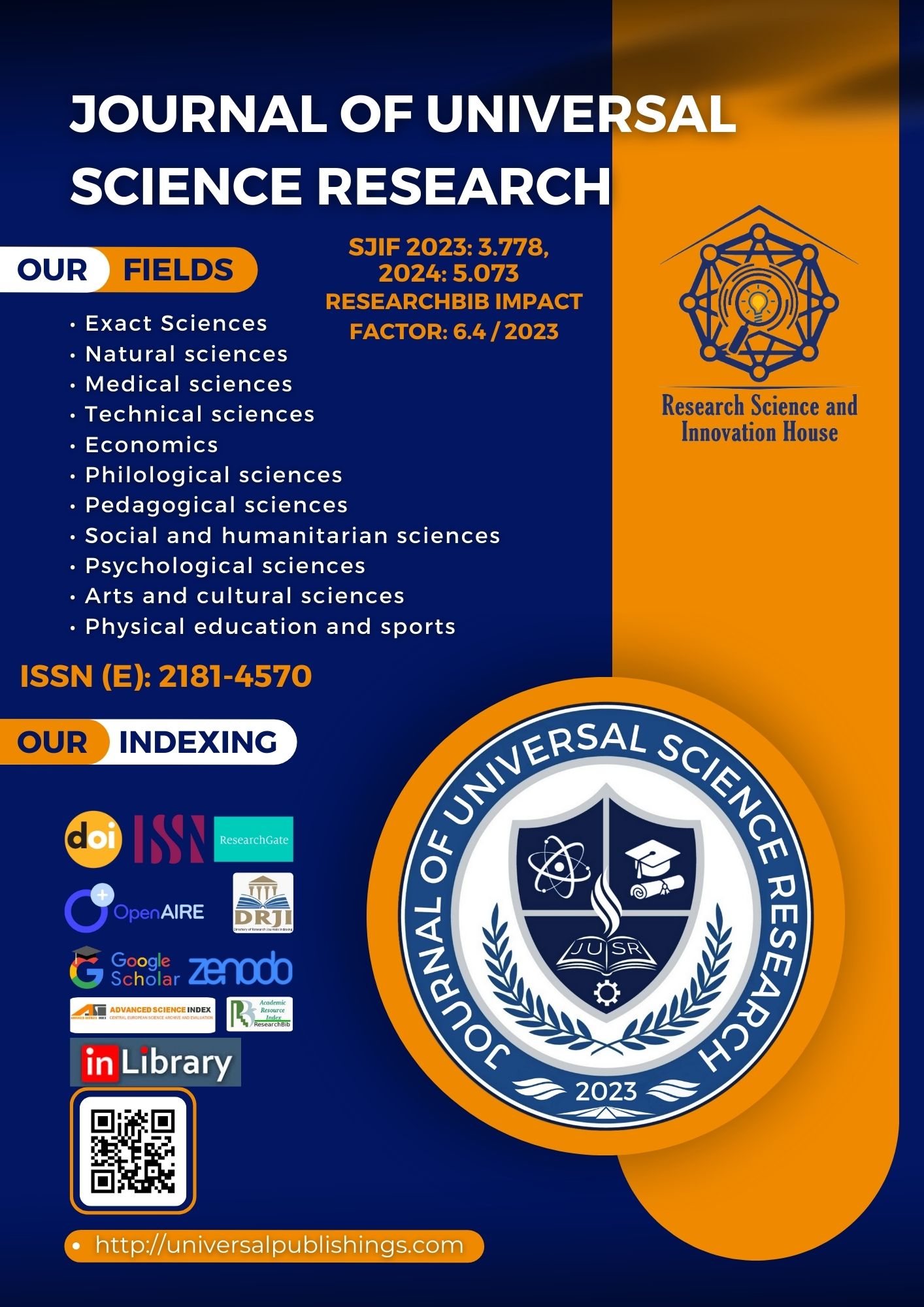Abstract
This study investigates the intricate relationship between digital economic
expansion, resource utilization, and environmental sustainability in Uzbekistan. As the
country advances its digital economy, understanding the environmental consequences
of this growth becomes crucial for policy-making. The research explores how
Uzbekistan’s digital-driven GDP growth impacts resource consumption, particularly
focusing on energy usage, water resources, and land utilization, alongside
environmental degradation indicators such as CO2 emissions and pollution levels.
References
1. Astanakulov Olim Tashtemirovich, Muhammad Eid Balbaa, Foziljonov
Ibrohimjon, Nilufar Batirova. (2024). Investigating the Impact of Artificial
Intelligence on Digital Marketing Tactics Strategies Using Neutrosophic Set.
International Journal of Neutrosophic Science, 23 ( 3 ), 175-183.
2. B. Kuziboev, P Vysusilova, R. Salahodjaev, A. Rajabov, T. Rakhimov. The
Volatility Assessment of CO2 Emissions in Uzbekistan: ARCH/GARCH
Models. International Journal of Energy Economics and Policy, 13(5), 1-7
(2023). doi: 10.32479/ijeep.14487
3. Balbaa, M. E. (2024). Socio-Economic Indicators and their Impact on
Sustainable Economic Development: An In-depth Analysis of Egypt.
International Journal of Economics and Financial Issues, 14(2), 136–145.
https://doi.org/10.32479/ijefi.16016
4. Ch. Hsu, F. Chien. The impact of high economic growth and technology
advancement on extensive energy production in China: evidence using NARDL
model, Environmental Science and Pollution Research, 30, 1656–1671 (2023)
https://doi.org/10.1007/s11356-022-22205-7
5. E. Akhmetshin, S. Zhiltsov, A. Dmitrieva, A. Plotnikov, A. Kolomeytseva. The
formation of the contemporary renewable energy sector and its role in the
industry development. International Journal of Energy Economics and Policy,
9(6), 373-378 (2019). doi:10.32479/ijeep.8229
6. I. Mateia. Is there a Link between Renewable Energy Consumption and
Economic Growth? A Dynamic Panel Investigation for the OECD Countries,
ISSN (E): 2181-4570 RESEARCHBIB IMPACT FACTOR: 6,4 / 2023 SJIF 2024 = 5.073
VOLUME-2, ISSUE-11
403
Dans Revue d'économie politique, 127, 985 à 1012 (2017). ÉditionsDalloz
ISSN 0373-2630 DOI10.3917/redp.276.0985
7. IEA (International Energy Agency). Uzbekistan 2022: Energy Policy Review,
95-98 (2022). https://www.iea.org/reports/uzbekistan-2022
8. J. Behera, A.K. Mishra. Renewable and non-renewable energy consumption
and economic growth in G7 countries: evidence from panel autoregressive
distributed lag (PARDL) model (2020). IEEP 17(1): 241–258
9. Kuldasheva, Zebo and Ismailova, Nilufar and Balbaa, Muhammad, Evaluating
the Factors Affecting Consumer's Online Shopping Behavior: The Case of
Uzbekistan, 2022, isbn 9781450387347, Association for Computing
Machinery, New York, NY, USA, https://doi.org/10.1145/3508072.3508126,
ICFNDS 2021 pages 328–333.
10.M.H. Zrelli. Renewable energy, non-renewable energy, carbon dioxide
emissions and economic growth in selected Mediterranean countries, Environ
Econ Policy Stud. 19, 691–709 (2017). DOI 10.1007/s10018-016-0170-5
11.Muhammad Eid Balbaa, Astanakulov O. Tashtemirovich. (2023). Fusion-Based
Econometric Analysis: Assessing Investment Project Efficacy and Business
Decision Making. Fusion: Practice and Applications, 13 ( 2 ), 145-155.
https://doi.org/10.54216/FPA.130213
12.N. Apergis, B. Kuziboev, I. Abdullaev, A. Rajabov. Investigating the
association among CO2 emissions, renewable and non-renewable energy
consumption in uzbekistan: An ARDL approach. Environmental Science and
Pollution Research, 30(14), 39666-39679 (2023). doi:10.1007/s11356-022-
25023-z
13.O. Saidmamatov, N. Tetreault, D. Bekjanov, E. Khodjaniyazov, E. Ibadullaev,
Y. Sobirov, L. R. Adrianto. The nexus between agriculture, water, energy and
environmental degradation in central Asia—Empirical evidence using panel
data models. Energies, 16(7) (2023). doi:10.3390/en16073206
14.Olim, A., Balbaa, M. E., Mukhabbatkhon, B., Batirova, N., & Dadabaev, U.
(2024). Enhancing Housing Finance for Socio-Economic Stability in
ISSN (E): 2181-4570 RESEARCHBIB IMPACT FACTOR: 6,4 / 2023 SJIF 2024 = 5.073
VOLUME-2, ISSUE-11
404
Uzbekistan. International Journal of Economics and Financial Issues, 14(3),
140–148. https://doi.org/10.32479/ijefi.16269
15.S. Chindo, A. Abdulrahim, S.I. Waziri, W.M. Huong, A.A. Ahmad. Energy
consumption, CO2emissions and GDP in Nigeria, GeoJournal, 80, 315–322
(2015) DOI 10.1007/s10708-014-9558-

This work is licensed under a Creative Commons Attribution 4.0 International License.

